compare和contrast
英语词汇(145)compare、contrast
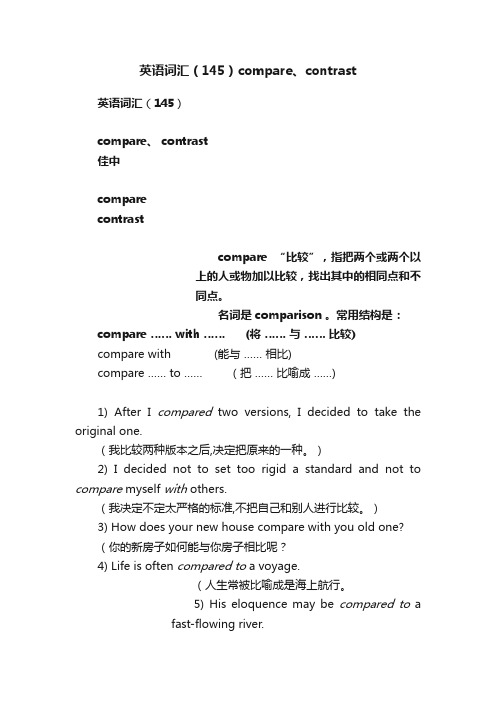
英语词汇(145)compare、contrast 英语词汇(145)compare、 contrast佳中comparecontrastcompare “比较”,指把两个或两个以上的人或物加以比较,找出其中的相同点和不同点。
名词是 comparison 。
常用结构是:compare …… with …… (将……与……比较)compare with (能与……相比)compare …… to …… (把……比喻成……)1) After I compared two versions, I decided to take the original one.(我比较两种版本之后,决定把原来的一种。
)2) I decided not to set too rigid a standard and not to compare myself with others.(我决定不定太严格的标准,不把自己和别人进行比较。
)3) How does your new house compare with you old one?(你的新房子如何能与你房子相比呢?4) Life is often compared to a voyage.(人生常被比喻成是海上航行。
5) His eloquence may be compared to afast-flowing river.(他的口才好比水流湍急的河流。
)contrast “对照”,指把两种东西进行对比、对照。
从而找出相异之处。
可用作动词或名词,常用结构是:动词contrast wit …….. (与……对照)名词contrast to ……. (与……对照)1) This cold weather contrasts with last week’s heat.(这冷天气同上星期的热天气成想鲜明对比。
)2) His elegant clothes contrast sharply with his rough speech.His elegant clothes are a sharp contrast to his rough speech.(他华丽的衣服与他的粗糙的语言形成强烈的对比。
igcse经济学structure question中常用词汇
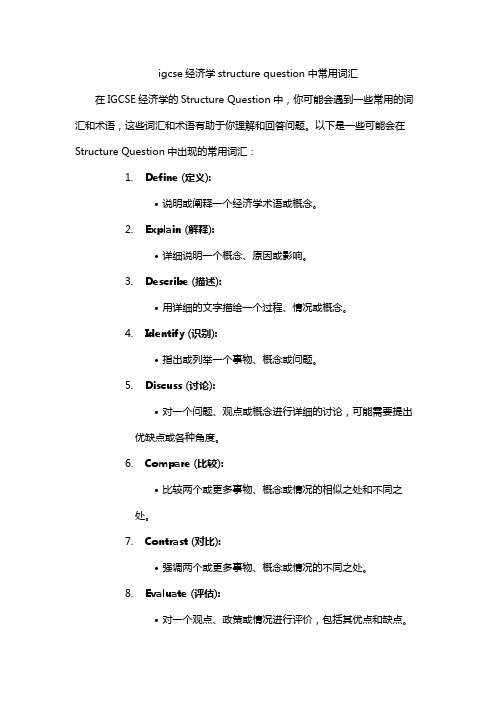
igcse经济学structure question中常用词汇在IGCSE经济学的Structure Question中,你可能会遇到一些常用的词汇和术语,这些词汇和术语有助于你理解和回答问题。
以下是一些可能会在Structure Question中出现的常用词汇:1.Define (定义):•说明或阐释一个经济学术语或概念。
2.Explain (解释):•详细说明一个概念、原因或影响。
3.Describe (描述):•用详细的文字描绘一个过程、情况或概念。
4.Identify (识别):•指出或列举一个事物、概念或问题。
5.Discuss (讨论):•对一个问题、观点或概念进行详细的讨论,可能需要提出优缺点或各种角度。
pare (比较):•比较两个或更多事物、概念或情况的相似之处和不同之处。
7.Contrast (对比):•强调两个或更多事物、概念或情况的不同之处。
8.Evaluate (评估):•对一个观点、政策或情况进行评价,包括其优点和缺点。
9.Analyze (分析):•对一个问题、事件或情况进行深入的分析,可能需要识别其组成部分和相互关系。
10.Assess (评估):•类似于Evaluate,对一个问题或观点进行全面的评估。
11.Examine (检查):•仔细研究一个问题、概念或情况,可能需要关注细节。
12.Illustrate (举例说明):•使用例子或图表来说明一个观点或概念。
13.Outline (概述):•给出一个简要的总结或概述,不需要详细阐述。
14.Elaborate (详细阐述):•提供详细的信息或解释,以充实和扩展某个观点。
15.Justify (证明或辩解):•为一个观点、决策或行为提供理由或证据。
这些词汇可以帮助你理解问题并有针对性地回答Structure Question。
在回答问题时,确保你理解每个关键词的含义,并根据问题的要求提供相应的信息。
考试常用的英语单词

考试常用的英语单词以下是一些常用于考试中的英语单词,附带中文翻译:1. analyze - 分析。
2. assess - 评估。
3. evaluate - 评价。
4. interpret - 解释。
5. compare - 比较。
6. contrast - 对比。
7. define - 定义。
8. describe - 描述。
9. discuss - 讨论。
10. explain - 解释。
11. identify - 确定。
12. illustrate - 阐明。
13. summarize - 总结。
14. demonstrate - 示范。
15. outline - 概述。
16. argue - 争论。
17. justify - 证明合理性。
18. conclude - 结论。
19. criticize - 批评。
20. propose - 提议。
21. suggest - 建议。
22. support - 支持。
23. refute - 反驳。
24. inquire - 询问。
25. investigate - 调查。
26. analyze - 分析。
27. explore - 探索。
28. examine - 检查。
29. interpret - 解释。
30. infer - 推断。
31. evaluate - 评估。
32. review - 复习。
33. compare - 比较。
34. contrast - 对比。
35. describe - 描述。
36. discuss - 讨论。
37. explain - 解释。
38. justify - 证明合理性。
39. define - 定义。
40. outline - 概述。
41. summarize - 总结。
42. analyze - 分析。
44. assess - 评估。
45. evaluate - 评价。
46. interpret - 解释。
汉弗莱应对质询的五个标准模板-解释说明
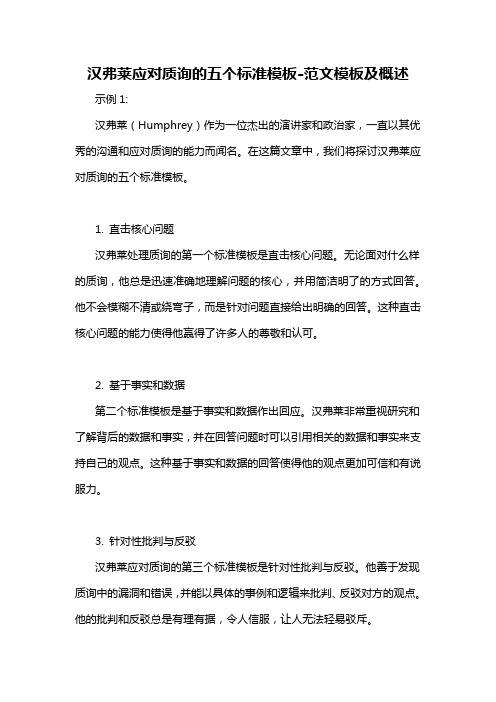
汉弗莱应对质询的五个标准模板-范文模板及概述示例1:汉弗莱(Humphrey)作为一位杰出的演讲家和政治家,一直以其优秀的沟通和应对质询的能力而闻名。
在这篇文章中,我们将探讨汉弗莱应对质询的五个标准模板。
1. 直击核心问题汉弗莱处理质询的第一个标准模板是直击核心问题。
无论面对什么样的质询,他总是迅速准确地理解问题的核心,并用简洁明了的方式回答。
他不会模糊不清或绕弯子,而是针对问题直接给出明确的回答。
这种直击核心问题的能力使得他赢得了许多人的尊敬和认可。
2. 基于事实和数据第二个标准模板是基于事实和数据作出回应。
汉弗莱非常重视研究和了解背后的数据和事实,并在回答问题时可以引用相关的数据和事实来支持自己的观点。
这种基于事实和数据的回答使得他的观点更加可信和有说服力。
3. 针对性批判与反驳汉弗莱应对质询的第三个标准模板是针对性批判与反驳。
他善于发现质询中的漏洞和错误,并能以具体的事例和逻辑来批判、反驳对方的观点。
他的批判和反驳总是有理有据,令人信服,让人无法轻易驳斥。
4. 善用幽默和机智第四个标准模板是善用幽默和机智。
汉弗莱擅长运用幽默和机智来化解紧张的气氛,并吸引观众的注意力。
他的幽默和机智常常出乎意料,令人捧腹大笑,使得他的回答更加生动有趣。
5. 保持冷静和自信最后一个标准模板是保持冷静和自信。
无论面对多么棘手的质询,汉弗莱总能保持冷静和自信的态度。
他不会被对方的挑衅或威胁所影响,而是用冷静和自信的语言和肢体语言来回应。
这种冷静和自信的态度给人一种稳定和可靠的感觉。
总的来说,汉弗莱应对质询的五个标准模板包括直击核心问题、基于事实和数据、针对性批判与反驳、善用幽默和机智以及保持冷静和自信。
这些模板使得他的回答在政治演讲和公开辩论中始终出类拔萃,成为了一个楷模和榜样。
无论是对于学习演讲还是提高沟通能力,我们都可以从汉弗莱的经验中汲取宝贵的教训。
示例2:汉弗莱应对质询的五个标准模板汉弗莱(Hanifley)是一种有效的沟通和表达思想的策略和工具。
对比的英语单词

对比的英语单词When it comes to the English language, the words "compare" and "contrast" are often used interchangeably, yet they carry distinct nuances. "Compare" focuses on finding similarities between two or more subjects, while "contrast" highlights their differences.In educational settings, comparing and contrasting are essential skills that help students analyze and understand complex topics. For instance, comparing two historical events can reveal common causes, whereas contrasting them can illuminate the unique outcomes and impacts.The art of comparison can be seen in everyday life as well. From choosing between two types of fruit based on taste and texture to comparing the features of different smartphones, we make decisions by identifying likenesses.Contrast, on the other hand, is vital in distinguishing between options. When evaluating two job offers, one might contrast the salary, benefits, and work environment to determine the best fit for their career goals.In literature, authors often use comparison to draw parallels between characters or themes, enhancing thereader's understanding of the narrative. Contrast, however, is used to create tension and conflict, driving the plot forward.In the realm of science, comparing and contrasting are fundamental to research. Scientists compare data sets to identify patterns, while contrasting variables helps to isolate the effects of specific factors in an experiment.Ultimately, the ability to compare and contrast is a powerful tool for critical thinking. It allows us to dissect information, make informed choices, and gain a deeper understanding of the world around us.。
Comparison&Contrast
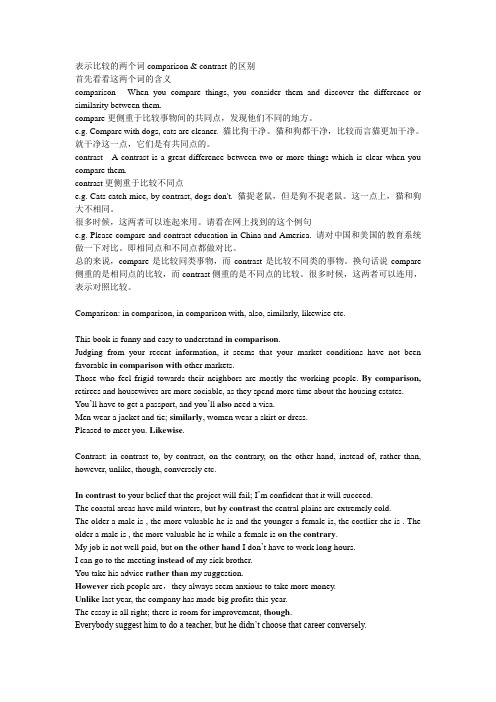
表示比较的两个词comparison & contrast的区别首先看看这两个词的含义comparison - When you compare things, you consider them and discover the difference or similarity between them.compare更侧重于比较事物间的共同点,发现他们不同的地方。
e.g. Compare with dogs, cats are cleaner. 猫比狗干净。
猫和狗都干净,比较而言猫更加干净。
就干净这一点,它们是有共同点的。
contrast - A contrast is a great difference between two or more things which is clear when you compare them.contrast更侧重于比较不同点e.g. Cats catch mice, by contrast, dogs don't. 猫捉老鼠,但是狗不捉老鼠。
这一点上,猫和狗大不相同。
很多时候,这两者可以连起来用。
请看在网上找到的这个例句e.g. Please compare and contrast education in China and America. 请对中国和美国的教育系统做一下对比。
即相同点和不同点都做对比。
总的来说,compare是比较同类事物,而contrast是比较不同类的事物。
换句话说compare 侧重的是相同点的比较,而contrast侧重的是不同点的比较。
很多时候,这两者可以连用,表示对照比较。
Comparison: in comparison, in comparison with, also, similarly, likewise etc.This book is funny and easy to understand in comparison.Judging from your recent information, it seems that your market conditions have not been favorable in comparison with other markets.Those who feel frigid towards their neighbors are mostly the working people. By comparison, retirees and housewives are more sociable, as they spend more time about the housing estates. You’ll have to get a passport, and you’ll also need a visa.Men wear a jacket and tie; similarly, women wear a skirt or dress.Pleased to meet you. Likewise.Contrast: in contrast to, by contrast, on the contrary, on the other hand, instead of, rather than, however, unlike, though, conversely etc.In contrast to your belief that the project will fail; I’m confident that it will succeed.The coastal areas have mild winters, but by contrast the central plains are extremely cold.The older a male is , the more valuable he is and the younger a female is, the costlier she is . The older a male is , the more valuable he is while a female is on the contrary.My job is not well paid, but on the other hand I don’t have to work long hours.I can go to the meeting instead of my sick brother.You take his advice rather than my suggestion.However rich people are,they always seem anxious to take more money.Unlike last year, the company has made big profits this year.The essay is all right; there is room for improvement, though.Everybody suggest him to do a teacher, but he didn’t choose that career conversely.however和whatever引导从句时的用法However的用法主要有以下两点:(一)用作连接副词,相当于no matter how,引导让步状语从句,意思是“不管怎样……”“无论如何……”,具体结构有以下两种:1.however+形容词+主语+系动词,例:However rich people are,they always seem anxious to take more money.无论人们有多富裕,他们似乎总是渴望挣到更多的钱。
英文中对比和比较的区别

英文中对比和比较的区别The difference between comparing and contrasting in English can be described as follows:comparing and contrasting are both used to express the idea of comparing and evaluating two or more things. However, there are some key differences between the two phrases.compare: This phrase is used to refer to comparing two or more things to see if they are similar or different. The main goal is to identify similarities and differences between the things being compared. For example, you might compare the colors of two的花朵 to see if they are similar or different.contrast: This phrase is used to refer to comparing two or more things to see if they are against each other. The main goal is to identify differences between the things being compared. For example, you might contrast the colors of two的花朵 to see if they are互补 or similar. In summary, while both comparing and contrasting are used to express the idea of evaluating two or more things, there are key differences in their usage and meaning. compare is used to identify similarities between things, while contrast is used to identify differences between things.。
英语作文四大结构
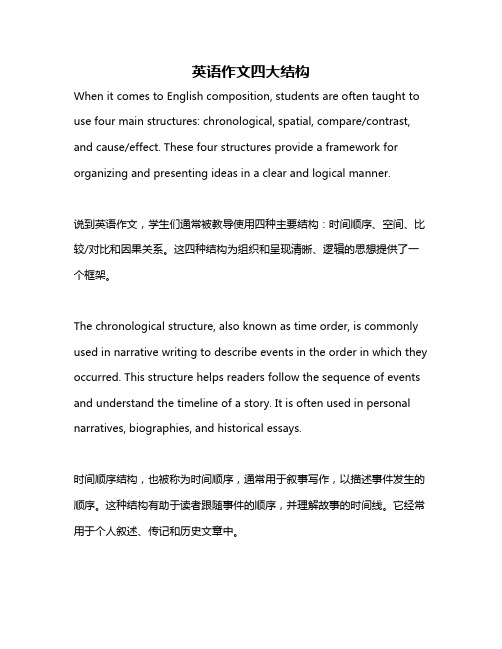
英语作文四大结构When it comes to English composition, students are often taught to use four main structures: chronological, spatial, compare/contrast, and cause/effect. These four structures provide a framework for organizing and presenting ideas in a clear and logical manner.说到英语作文,学生们通常被教导使用四种主要结构:时间顺序、空间、比较/对比和因果关系。
这四种结构为组织和呈现清晰、逻辑的思想提供了一个框架。
The chronological structure, also known as time order, is commonly used in narrative writing to describe events in the order in which they occurred. This structure helps readers follow the sequence of events and understand the timeline of a story. It is often used in personal narratives, biographies, and historical essays.时间顺序结构,也被称为时间顺序,通常用于叙事写作,以描述事件发生的顺序。
这种结构有助于读者跟随事件的顺序,并理解故事的时间线。
它经常用于个人叙述、传记和历史文章中。
On the other hand, the spatial structure is used to organize information based on location or physical arrangement. This structure is often used in descriptive writing to create a clear picture of a place, object, or scene. By using spatial organization, writers can guide readers through a visual representation of the subject matter.另一方面,空间结构用于根据位置或物理布局来组织信息。
- 1、下载文档前请自行甄别文档内容的完整性,平台不提供额外的编辑、内容补充、找答案等附加服务。
- 2、"仅部分预览"的文档,不可在线预览部分如存在完整性等问题,可反馈申请退款(可完整预览的文档不适用该条件!)。
- 3、如文档侵犯您的权益,请联系客服反馈,我们会尽快为您处理(人工客服工作时间:9:00-18:30)。
一、我们先从两者的定义入手来看两者的区别。
Compare的定义为:to examine people or things to see how they are similar/alike or differen t.
Contrast的定义为:to compare two or more things to show the difference between them.
由定义不难看出前者侧重于找到两个或多个事物的异同,而后者则侧重于它们的不同。
二、compare..., 就是比较和找出共同点,通常会在两个不同的东西做比较,比如番茄和苹果的共同点;如果题目有contrast....时,就是比较两个表面类似的东西并找出不同之处,像比较红苹果和青苹果。
The cloud looks very bright in contrast with the blue sky.
在蓝天的映衬下云显得很白。
The man appears to be very tall and thin in contrast with his fat wife.
在他肥胖的太太的对照下,他看上去又高又瘦。
compare常常是指同一类型东西的范围和程度上的差别,因此常常会和比较级连用,比如:
Compare to French and German, English is much easier to learn.
和法语以及德语相比,英语好学多了。
It costs nothing compare to what I have spent before.
和我所花出去的比起来,这几乎不值什么钱。
三、还有一些固定搭配,再如:
It is interesting to compare their situations to ours.
对比一下我们的情况与他们的情况会很有趣。
It is interesting to contrast their situations to ours.
我们的情况与他们的情况有很大的不同,这很有趣。
再看一个引自OXFORD ADBANCED LEARNER’S DICTIONARY(《牛津高阶初学者(……)字典》)的例子:
There is an obvious contrast between the culture of East and West.
东西方文化有着明显对比(不同)。
The company lost $7 million in contrast to a profit of $6.2 million a year earlier.
相较与一年之前620万美元的利润(不同),公司损失了700万美元。
When you look at their new system, ours seems very old-fashioned by contrast.
当你看他们的新系统,比较起来(与之相反),我们的似乎很老式。
不难发现,Compare 翻译为“与……相比”
而contrast可译为“明显不同的是……”,切记这种翻译方式就不会用错彼此了。
